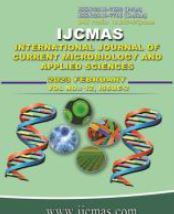


 National Academy of Agricultural Sciences (NAAS)
National Academy of Agricultural Sciences (NAAS)

|
PRINT ISSN : 2319-7692
Online ISSN : 2319-7706 Issues : 12 per year Publisher : Excellent Publishers Email : editorijcmas@gmail.com / submit@ijcmas.com Editor-in-chief: Dr.M.Prakash Index Copernicus ICV 2018: 95.39 NAAS RATING 2020: 5.38 |
Infections caused by ESBLs-producing E. coli continue to represent a challenge for the implementation of appropriate treatment protocols worldwide. The objective of the present study was to assess the current profile of antimicrobial and ESBLs susceptibility, to screen the bla-CTX-M, bla-TEM, bla-SHV and qnrs genotypes of ESBLs-producing or non-isolated ESBLs-producing Multi-resistant E. coli (MDR) strains of various clinical samples in Chad. This is a prospective study conducted from September 2018 to February 2019 at the N’Djamena University Hospital in Chad. E. coli MDR has been isolated from urine, pus and stool cultures. Antibiotic identification and susceptibility testing was performed using an automated system, the Vitek-2. Confirmation for ESBLs production was performed by the double disc synergy assay. The E.coli MDR and ESBLs strains, positive or not, were screened for the genes encoding the ESBLs and qnrs by PCR. Microsoft Excel 2016 and SPSS ™ statistical software version 20.0 were used for the analysis of the results. Of the 68 MDR E. coli isolated from various clinical samples, 40 (58.8%) were positive for extended spectrum beta-lactamase production. 47.1% were resistant to the twelve (12) antibiotics tested. All isolates with an ESBLs phenotype were resistant to at least one antibiotic tested. The CTX-M gene was in the majority (72.1%), followed by TEM (54.4%) and SHV (16.2%). The qnrs genes were also detected in 52.9% (qnrA1 to A6), 52.9% (qnrB1 to B6) and 2.9% (qnrS1 to S6). All strains showing an ESBLs phenotype (40) were also positive in the molecular screening of ESBLs gene families. A double and triple carriage of the ESBLs and qnrs genes was observed. These results show the need for an aggressive infection control program, systematic detection of ESBLs isolates in clinical samples and antimicrobial management in hospitals in Chad.
 |
 |
 |
 |
 |